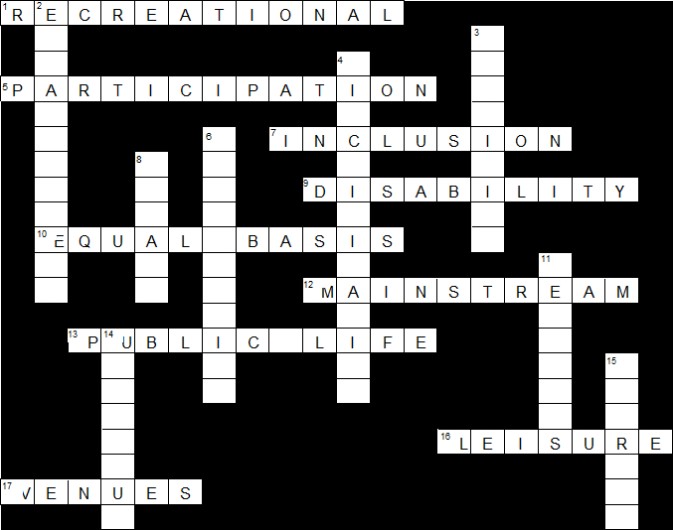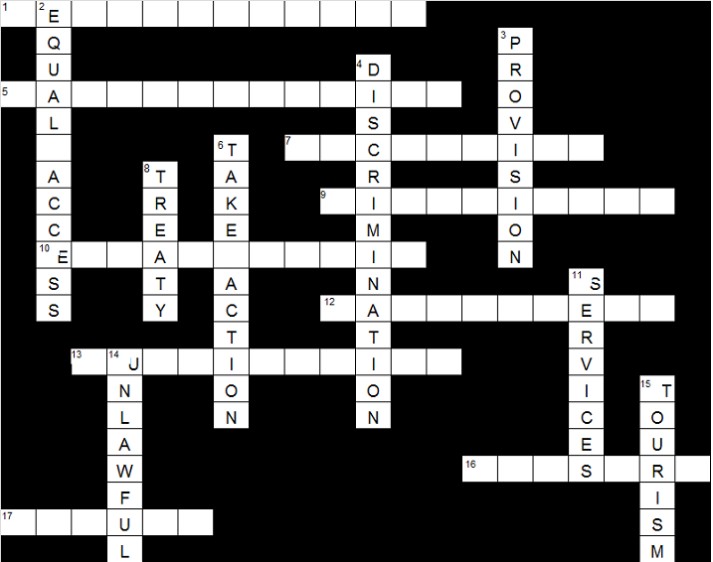Resources
Activity and Resource Sheets
Rights Ed Activity Sheet: Sports and people with disabilities – interactive crossword
Across solutions
Rights Ed Activity Sheet: Sports and people with disabilities – interactive crossword
Down solutions
Rights Ed Resource Sheet: Background information - Sport and people with disabilities
All people have the right to participate in recreation, leisure and sporting activities.
Australia has a law called the Disability Discrimination Act (DDA) that protects individuals from unfair treatment in many parts of public life including in sport. The DDA makes disability discrimination unlawful, and promotes equal rights, equal opportunity and equal access for people with disabilities.
Australia has also signed an important international treaty called the Convention on the Rights of Persons with Disabilities or the Disability Convention for short.
The Disability Convention identifies how to take action to allow people with disabilities to participate on an equal basis with others in recreational, leisure and sporting activities:
-
To encourage and promote the participation, to the fullest extent possible, of people with disabilities in mainstream sporting activities at all levels
-
To ensure that people with disabilities have an opportunity to organise, develop and participate in disability-specific sporting and recreational activities and, to this end, encourage the provision, on an equal basis with others, of appropriate instruction, training and resources
-
To ensure that people with disabilities have access to sporting, recreational and tourism venues
-
To ensure that children with disabilities have equal access with other children to participation in play, recreation and leisure and sporting activities, including those activities in the school system
- To ensure that people with disabilities have access to services from those involved in the organisation of recreational, tourism, leisure and sporting activities
Rights Ed Activity Sheet: Sport and people with disabilities

Image Caption: “Restless Dancer” by Katie Pashley, Australian Human Rights Commission Photography Competition winner
| 1. How do you think you can encourage and promote the participation of people with disabilities in sports? In your answer, try to consider a broad range of disabilities |
|
|
| 2. Can you think of examples where people with disabilities organise, develop and participate in sport without barriers? This could be a local, national or an international event. Hint: Do you remember what happened in London in 2012? |
| 3. Do you know if people with disabilities have access to sporting venues in your local area? Can you think of an example of this occurring? If you can’t, why do you think this is? |
| 4. Do you think students with disabilities have equal access as other students and young people to sporting and recreational opportunities in school? Do you think this could be improved? If yes, how do you think this could be improved? |
Rights Ed Activity: Researching an adapted or modified sport
Instructions: Research an adapted or modified sport and write a brief report on the sport.
|
Name of sport
|
|
What are the rules?
|
|
What is the history of the sport?
|
|
Who is it played by?
|
|
Is it included in any major organised sport competitions?
|
Adapted or modified sport in your local area
Instructions: Research an adapted sport or sport program which has had barriers to participation removed and is offered in the local area. Discuss how accessible these programs are for students with and without disabilities.
|
Name of sport
|
|
What are the rules?
|
|
What is the history of the sport in your local area?
|
|
How accessible is this sport program to students with and without disabilities.?
|
Rights Ed Activity Sheet: Rockwheelers - viewing questions
Watch the Rockwheelers video http://youtu.be/2m-lR7GHJxc
| Question | Answer |
|---|---|
| 1. Who are the Rockwheelers? |
|
| 2. When did the wheelchair basketball program begin? |
|
| 3. How long has Paul been playing wheelchair basketball? |
|
| 4. How did Paul feel after his accident? |
|
| 5. What unites players on the court? |
|
| 6. Why does Daniel enjoy being in the Rockwheelers? |
|
| 7. What do you think has contributed to Paul’s sense of wellbeing since he joined the Rockwheelers? |
|
Rights Ed Activity: Rockwheelers – question cards
| Question 1 | Question 2 |
| What might stop a person with disabilities from participating in a sport?
Refer specifically to issues raised in the video, as well as other possible factors. Aside from issues arising directly from disabilities, discuss emotional and psychological factors.
|
What are some of the benefits of participating in team sports? Refer specifically to benefits highlighted in the video, as well as other possible benefits. |
| Question 3 | Question 4 |
| Why might participation in a team sport be especially beneficial for people with disabilities?
Refer specifically to benefits highlighted in thevideo, as well as other possible benefits.
|
Why might a person without disabilities participate in inclusive sports? Refer specifically to the reasons discussed in the video, as well as other possible reasons. |
| Question 5 | Question 6 |
|
What were some of the issues that Paul faced when making the transition to having disabilities?
|
What impact did his accident have on him? What strategies helped him make this transition to having disabilities? |
Rights Ed Activity Sheet: Op-ed template
Title [the title needs to be catchy]:
Author/s:
Introduction: What is your opinion on the level of difficulty and challenge of modified or inclusive sports compared with sports which are not accessible to those with disabilities? Provide a brief overview of your arguments. The introduction needs to be interesting to grab the audience’s attention.
Argument 1: Develop an argument to support your opinion e.g. use your personal experiences of playing inclusive sport to support your view.
Argument 2: Develop an argument to support your opinion e.g. refer to local, national and international athletes with disabilities, and relevant programs and competitions.
Argument 3: Develop an argument to support your opinion e.g. how are inclusive sports beneficial for individuals participating in them and the whole community?
Conclusion: Re-state your opinion and provide a brief summary of your arguments.



